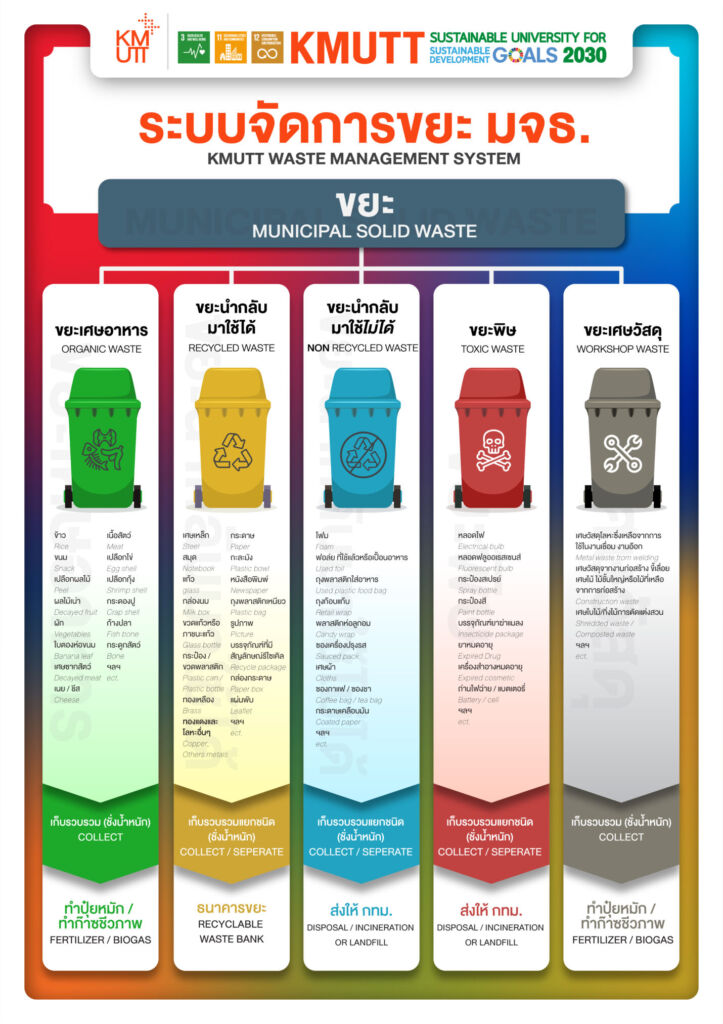
12.2 OPERATIONAL MEASURES
1. A policy on ethical sourcing of food and supplies
KMUTT provide a clear and concise policy on sustainable development, environmental preservation and sustainability. KMUTT pursuing sufficiency economy philosophy for sustainable development with surrounding communities; moreover, focusing on consevation of biodiversity and maintenance of ecosystem. To achieve the target, KMUTT transform campus to be an integral learning space where staffs and students become a main role to contribute sustainable development awarness at every opportunity or as known as social change agent. In term of responsible consumption and production, KMUTT provide food safety policy to ensure that all students and staffs can access to clean water and healthy food. This would represent on their safety life while study at KMUTT.
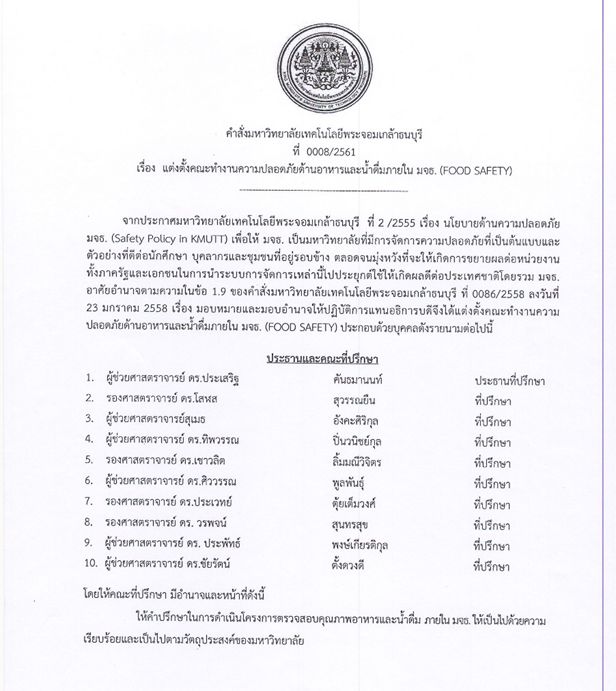
KMUTT Policy Food and drinking safety policy within KMUTT
King Mongkut’s University of Technology Thonburi (KMUTT) Order No. 0008/2561
Subject: Appointment of the Food and Drinking Water Safety Working Committee within KMUTT (FOOD SAFETY)
Pursuant to King Mongkut’s University of Technology Thonburi Announcement No. 2/2555 regarding the KMUTT Safety Policy, which aims for the University to be a model and good example of safety management for students, personnel, and surrounding communities, and to extend the application of these management systems to government and private sectors for the overall benefit of the nation, KMUTT, by virtue of the authority under Clause 1.9 of King Mongkut’s University of Technology Thonburi Order No. 0086/2558 dated January 23, 2558, concerning the assignment and delegation of authority to educational administrators, hereby appoints the Food and Drinking Water Safety Working Committee within KMUTT (FOOD SAFETY) consisting of the following individuals:
| No. | Name | Role in the Committee | |
| 1. | Asst. Prof. Dr. Prasert | Kanthamanon | Advisor |
| 2. | Assoc. Prof. Dr. Olas | Inkagul | Advisor |
| 3. | Asst. Prof. Sumet | Angkasirikul | Advisor |
| 4. | Asst. Prof. Dr. Tippawan | Pinvanichkul | Advisor |
| 5. | Assoc. Prof. Dr. chaowalit | Limmaneevichitr | Advisor |
| 6. | Asst. Prof. Dr. Sivawan | Phoolphundh | Advisor |
| 7. | Assoc. Prof. Dr. Pravate | Tuitemwong. | Advisor |
| 8. | Assoc. Prof. Dr. Worapot | Suntornsuk | Advisor |
| 9. | Asst. Prof. Dr. Prapat | Pongkiatkul | Advisor |
| 10. | Asst. Prof. Dr. Chairath | Tangduangdee | Advisor |
The Advisory Committee shall have the following power and duties:
To provide consultation for the implementation of the food and drinking water quality inspection project within KMUTT, ensuring its smooth operation and alignment with the University’s objectives.
KMUTT provide a clear and concise policy on sustainable development, environmental preservation and sustainability. towards building a sustainable society is a modern and caring democratic society and develop the world’s ecosystems. Guidelines for this sustainable university. by adhering to the philosophy of sufficiency economy as a base for decision-making leading to the creation of graduates and personnel who help leaders of change to achieve a desirable society which the university supports. Promote and formulate policies for operations in accordance with the ministerial regulations prescribing supplies and procurement methods that the government wants to promote or support (No. 2) 2020. on environmentally friendly parcels with support Promote and publicize the personnel in the university departments to see the importance of and is ready to be a part of changing new behaviors, choosing products and services that are environmentally friendly. as well as aiming to expand the effect on both the public and private agencies to benefit the nation.
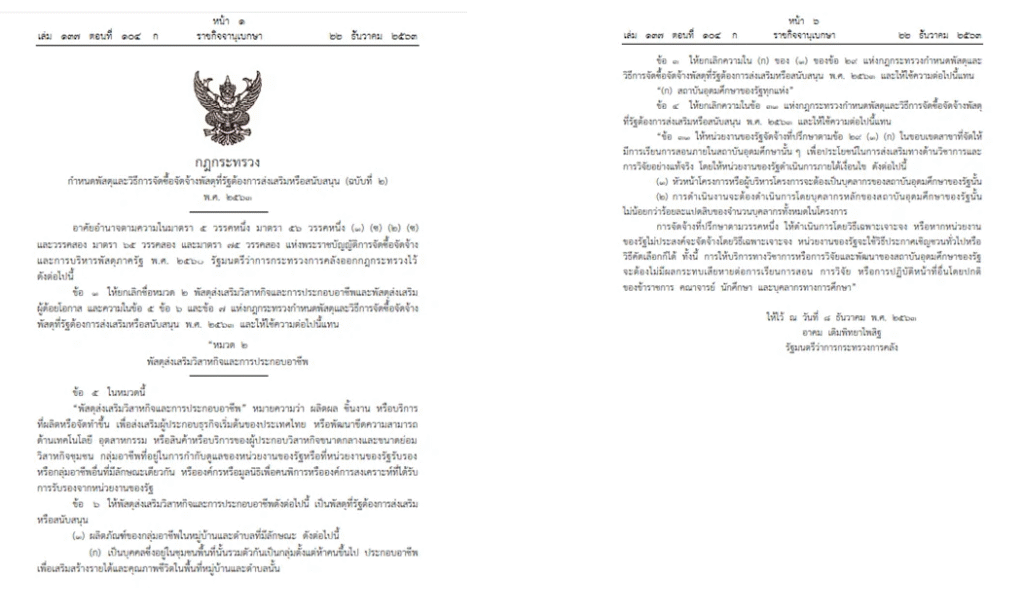
MINISTERIAL REGULATION
Prescribing the Goods and Methods of Procurement that the State Desires to Promote or Support (No. 2)
B.E. 2020
Pursuant to the powers under Section 5, paragraph one, Section 56, paragraph one (1) (c) (2) (7) and paragraph two, Section 65, paragraph two, and Section 75, paragraph two of the Government Procurement and Supplies Management Act B.E. 2017, the Minister of Finance issues the following Ministerial Regulations:
The item to cancel the name of Section 2, Enterprise and Occupation Promotion Supplies and Supplies for the Disadvantaged, and the contents of Sections 5, 6, and 7 of the Ministerial Regulations on Supplies and Procurement Methods for Supplies that the State Wants to Promote or Support, B.E. 2020, and to use the following instead.
Chapter 2
Enterprise and occupation promotion parcels
Item 5 in this category
“Enterprise and occupation promotion materials” means products, pieces of work, or services produced or prepared to promote Thai start-up entrepreneurs or to develop the technological, industrial, or product or service capabilities of small and mediumsized enterprises, community enterprises, occupational groups under the supervision of government agencies or certified by government agencies, or other occupational groups of the same nature, or organizations or foundations for people with disabilities or welfare organizations certified by government agencies.
Section 6 The following enterprise and occupation promotion parcels are parcels that the state wishes to promote or support:
(1) Products of occupational groups in villages and sub-districts with the following characteristics:
(a) is a person who lives in that community and comes together in groups of five or more people to work to increase income and improve the quality of life in that village and subdistrict.
Section 3 : To revoke the content of (a) of (1) of Section 29 of the Ministerial Regulations on Supplies and Meth ods for Procurement of Supplies that the State Wishes to Promote or Support, B.E. 2020, and to use the following instead:
-
- Every state institution of higher education
Section 4 : The content of Section 31 of the Ministerial Regulations on the Procurement of Supplies and Methods for the Procurement of Supplies that the State Wishes to Promote or Support, B.E. 2563, shall be repealed and the following shall be used instead:
Section 31 : requires government agencies to hire consultants in accordance with Section 29 (1) (a) within the scope of the fields provided for teaching within the respective higher education institutions for the benefit of truly promoting academics and research. Government agencies must operate under the following conditions:
-
- The project leader or project administrator must be a personnel of that state higher education institution.
-
- The operation must be carried out by key personnel of that state higher education institution, not less than eighty percent of the total number of personnel in the project.
The hiring of consultants under paragraph one shall be carried out by a specific method. If a government agency does not wish to hire by a specific method, the government agency may use a general invitation to hire or a selection method. However, the provision of academic services or research and development by a government higher education institution must not adversely affect teaching, research, or other normal duties of civil servants, faculty, students, and educational personnel.
Given on December 8, 2020
Arkom Termpittayapaisit
Minister of Finance
3. Policy waste disposal – hazardous materials
King Mongkut’s University of Technology Thonburi (KMUTT) there is a clear policy towards becoming a sustainable university, which means striving for the creation of a sustainable society, i.e., a modern and caring sovereign society, caring for and developing the world’s ecosystems. This approach to sustainable universities. This happens when using the “sufficiency economy philosophy” as the base for decision-making. This leads to the creation of graduates and staff who help each other to become leaders of change in order to achieve a desirable society (Social Change Agent), which the university has a waste management system, which is the policy of the university with the support of the management. The management system has been developed taking into account activities within the university. Encourage everyone to participate in various forms of waste management, such as promoting waste sorting, as waste sorting can reuse some of the waste that can be used. This will reduce the amount of waste that needs to be disposed of. Organize waste collection and transportation systems within the university and outside to ensure proper and correct waste management. As well as promoting cognitive and practical aspects of university. For more information as link : http://sustainable.kmutt.ac.th/waste/say-no-to-single-use-plastics/
Handout for Waste Management of KMUTT


Solid waste generated within King Mongkut’s University of Technology Thonburi waste will be sorted into 5 categories: food waste, recyclable waste, non-recyclable waste, toxic waste, and material waste and some types of waste are used, for example, food waste will be brought into the biogas system. Recycled waste will go to the waste bank. Some of the scrap material is recycled or enters the waste bank.
The waste that KMUTT cannot process or dispose of. will be sent to be disposed of through the BMA. The BMA will be sent to the Nong Khaem Solid Waste Disposal Center to enter the waste management system.
Nong Khaem Solid Waste Disposal Center
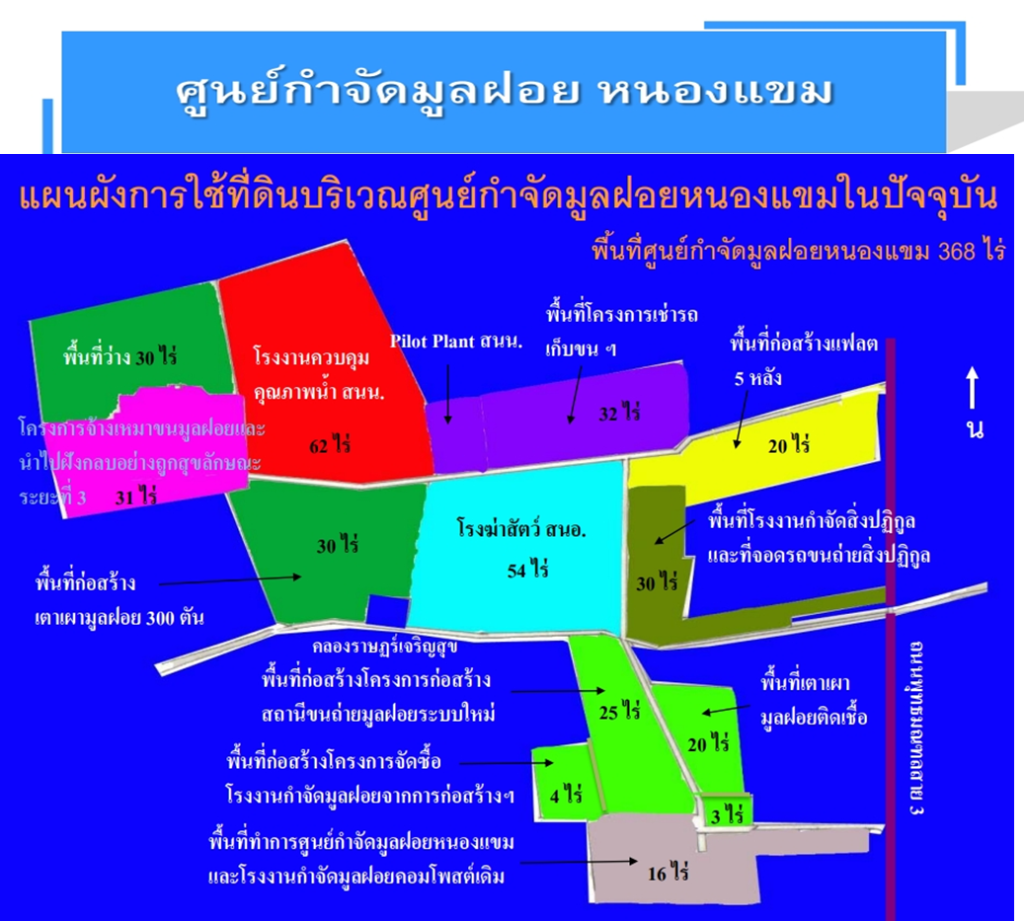
Electricity Club at KMUTT Conducts Workshop on Basic Electricity Usage and Smart Electrical Systems to Promote Learning and Reduce Plastic Waste
The Academic Electricity Club of King Mongkut’s University of Technology Thonburi (KMUTT) organized a workshop on “Basic Electricity Usage in Daily Life and the Application of Smart Electrical Systems” from August 16–17, 2025, at the Jamras Chaiyapong Meeting Room, Building 2. The event welcomed over 60 participants.
Activities included lectures and hands-on sessions on basic programming, using PZEM electrical measurement devices with Arduino boards, and applying Grafana software for real-time data visualization. The workshop aimed to enhance participants’ knowledge and skills in smart electrical systems, fostering continuous development in line with the university’s Code of Honor.
In addition, participants were encouraged to bring their own reusable water bottles instead of using single-use plastic bottles, promoting environmental awareness and reducing waste. The activity aligns with the United Nations Sustainable Development Goals and supports KMUTT’s vision of cultivating Change Agents with Green Heart, empowering students to create positive impacts for society and the nation.
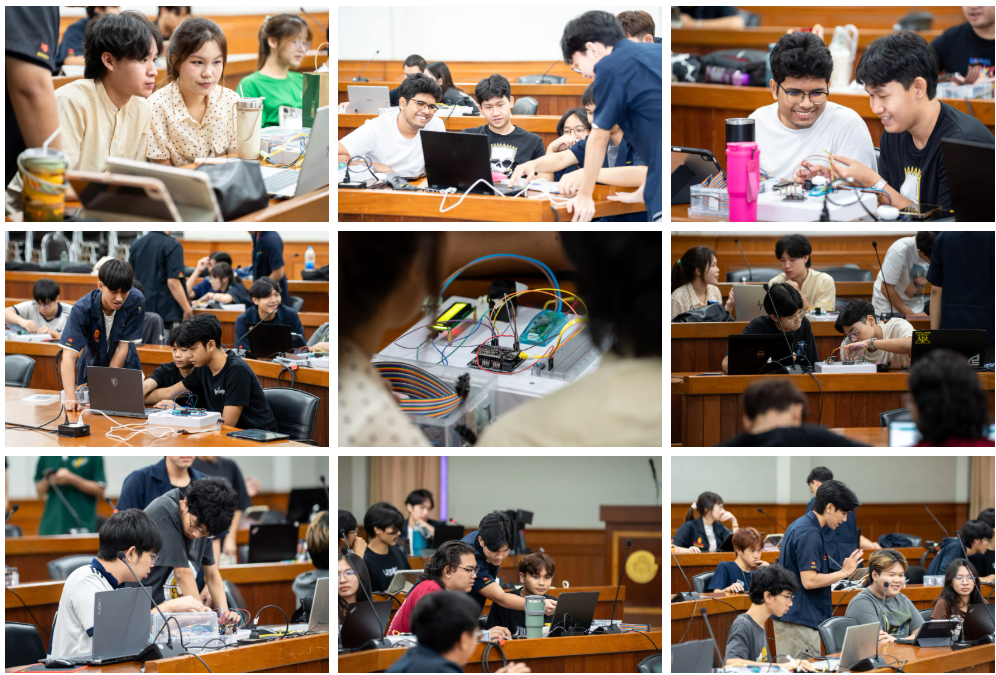
KMUTT Promotes Sustainable Waste Separation on Graduation Ceremony Day for the Academic Year 2023
On August 8, 2025, the Sustainability Activities Committee of King Mongkut’s University of Technology Thonburi (KMUTT), together with student volunteers, took part in waste separation activities during the university’s Graduation Ceremony for the Academic Year 2023. The event was held at the Royal Thai Navy Convention Hall, Arun Amarin Road, Wat Arun Subdistrict, Bangkok Yai District, Bangkok. The team provided on-site guidance to graduates and honored guests on proper waste disposal methods according to waste types, ensuring correct and efficient waste separation throughout the event.
This activity was part of KMUTT’s commitment to organizing events under the Sustainable Event concept, which aims to reduce waste generation, minimize environmental impacts, and raise awareness among participants about the importance of environmental responsibility.
The participation of student volunteers not only helped improve the efficiency of waste management during the ceremony but also reflected the strong environmental awareness and social responsibility of the younger generation—serving as a vital driving force toward a low-carbon and sustainable society in the future.
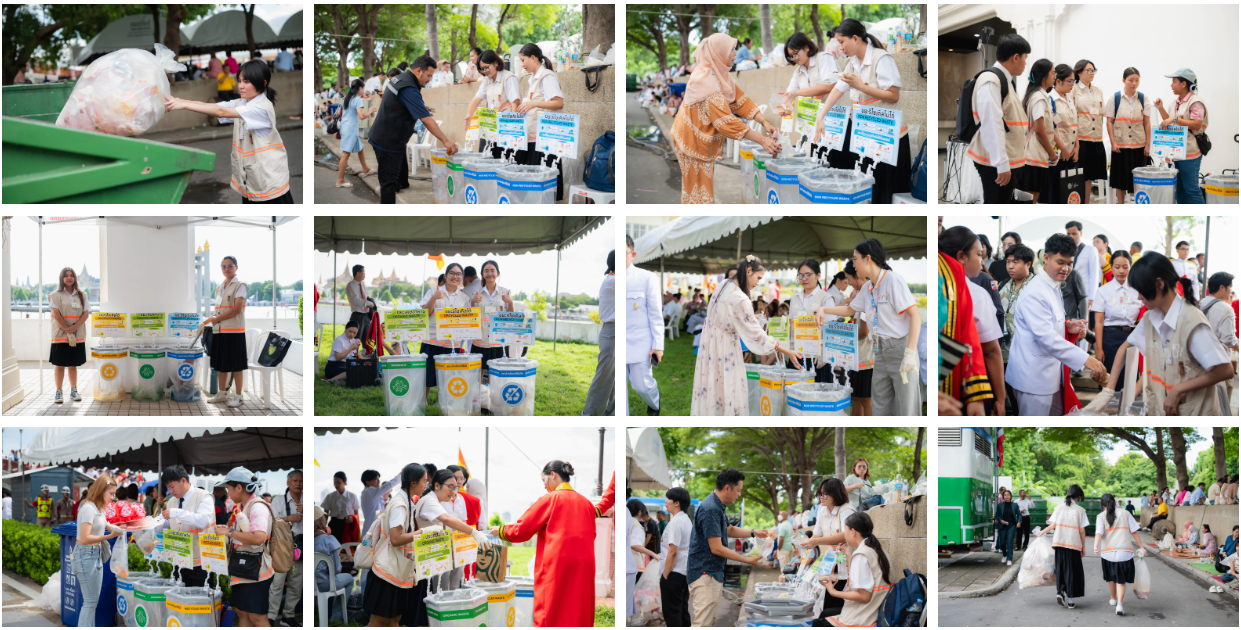
KMUTT Welcomes New Students with “KMUTT First Date 2025” — Fostering Sustainability and Waste Reduction from Day One
On July 20, 2025, the Student Government Organization of King Mongkut’s University of Technology Thonburi (KMUTT), in collaboration with various university departments, hosted the orientation event “KMUTT First Date 2025” to warmly welcome incoming students. The event introduced freshmen to the university’s structure, services, and support systems, while fostering connections among peers and senior students in a friendly, inclusive atmosphere. More than just a welcome event, the program strongly reflected KMUTT’s dedication to sustainability.
Participants were encouraged to bring their own reusable water containers and avoid single-use foam or plastic food containers, opting instead for reusable tableware to help reduce waste from the event. In addition, a volunteer waste management team was stationed at various waste disposal points throughout the venue to guide new students on proper waste separation and disposal practices. This initiative aimed to promote environmental awareness and responsible behavior from the very first day of university life. Through such actions, KMUTT continues to cultivate students as Change Agents with Green Hearts—young leaders empowered to drive sustainable transformation across campus and beyond.
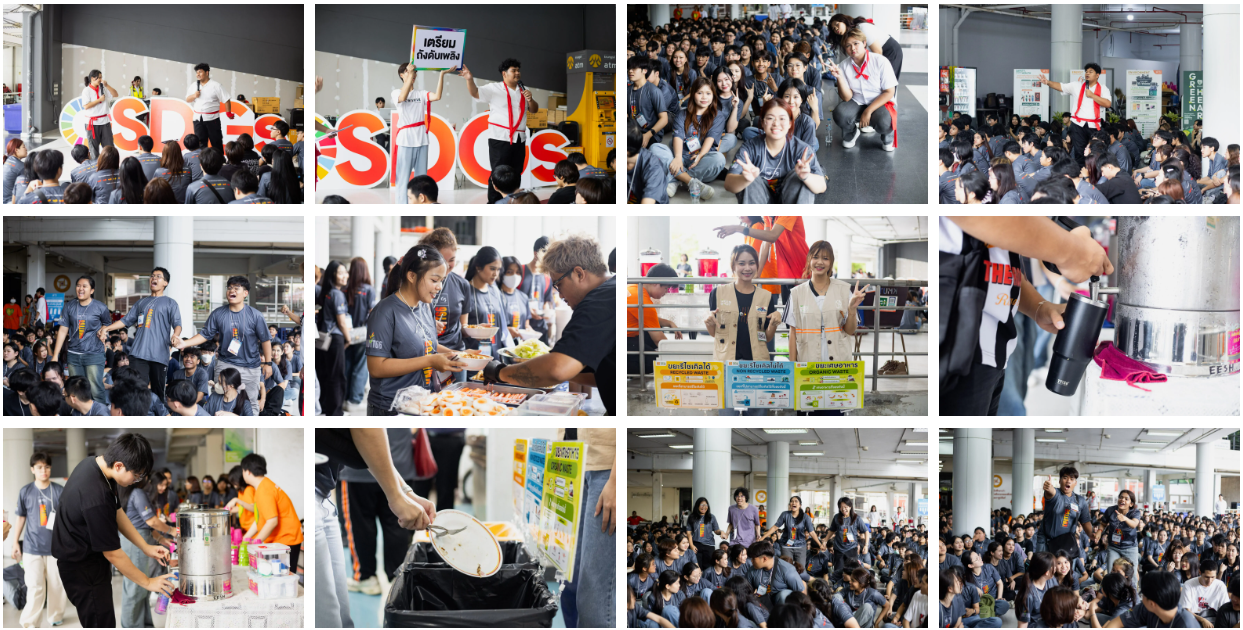
KMUTT Promotes Plastic Waste Reduction on World Environment Day 2025
On Thursday, June 5, 2025, King Mongkut’s University of Technology Thonburi (KMUTT), through the Energy, Environment, Safety, and Health (EESH) Center, organized a special event in celebration of World Environment Day 2025 under the global theme “Beat Plastic Pollution.”
The initiative aimed to raise awareness and encourage the university community to practice waste segregation at source, focusing particularly on reducing single-use plastics. As part of the campaign, students, staff, and faculty members were invited to exchange single-use plastic waste, such as plastic cups, bottles, and bags, for commemorative potted plants a symbolic gesture promoting green living and environmental consciousness.
The activity successfully collected a total of 12.7 kilograms of waste, consisting of:
-
- 11.5 kilograms of plastic bottles, and
-
- 1.2 kilograms of mixed waste, including glass bottles, aluminum cans, and opaque plastic containers.
All collected waste will be forwarded to KMUTT’s official Waste Bank system, where it will be processed and managed in alignment with the university’s sustainable waste management practices.
The event not only fostered a sense of environmental responsibility within the campus but also underscored the importance of individual actions in combating the global plastic crisis.
The next round of the waste-for-plant exchange is scheduled for June 30, 2025, at 10:30 AM, and will be held at the Multipurpose Area, 1st Floor, Office of the President Building. Everyone in the KMUTT community is encouraged to participate and contribute to a cleaner, greener future.
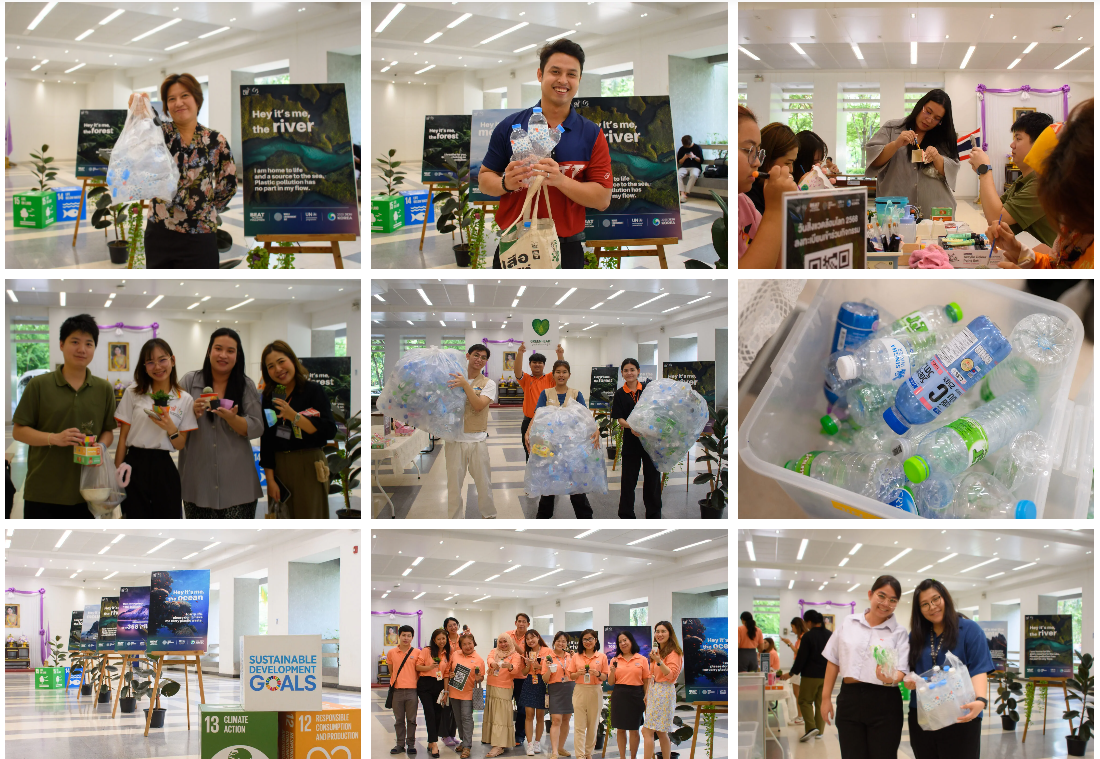
KMUTT and Partners Launch “Green Hero Kids” to Combat Plastic Waste on World Environment Day 2025
In celebration of World Environment Day 2025, the Environmental Social Sciences (ESS) Master’s Program under the School of Liberal Arts, King Mongkut’s University of Technology Thonburi (KMUTT), in collaboration with the Energy Environment Safety and Health (EESH) Center, ALS Laboratory Group (Thailand) Co., Ltd., and the To Be Number One Club of Bangchak Phra Pradaeng Community, Samut Prakan Province, jointly organized a community-engagement activity titled “Green Hero Kids: The Mission to Defeat Plastic Waste!”
This initiative is part of the broader campaign “WORLD ENVI DAY X SSH2025: Beat Plastic Pollution,” spearheaded by Asst. Prof. Dr. Ittisak Jirapornvaree, who leads the project.
The activity focused on promoting environmental awareness and fostering social change through education, skill development, and value cultivation in children and youth. Held in Benjasuk Community, Moo 7, Bangchak Subdistrict, Phra Pradaeng District, Samut Prakan, the program targeted young participants with an immersive, hands-on learning experience in plastic waste management.
The project emphasized three key pillars:
-
- Knowledge: Introducing fundamental concepts of waste and plastic pollution management
-
- Skills: Teaching practical techniques for waste sorting and recycling
-
- Attitudes: Instilling environmental responsibility and social consciousness in young minds
By building a foundation of environmental literacy and responsibility, the initiative aimed to serve as an early intervention strategy to foster sustainable habits and a protective mindset among local youth.
This collaboration reflects KMUTT’s commitment to advancing sustainability education and strengthening community ties through meaningful and impactful engagement.

KMUTT and Bangkok Partners Celebrate World Environment Day 2025 with “All About Waste” Campaign
King Mongkut’s University of Technology Thonburi (KMUTT), in collaboration with Bangkok Metropolitan Administration (BMA) and partner networks, joined hands to mark World Environment Day 2025 under the theme “All About Waste”, reaffirming its commitment to tackling the climate crisis through awareness-raising and environmental action.
Spearheaded by the university’s Green Heart student network, KMUTT led a series of interactive exhibitions and workshops focused on sustainable waste management through behavior change. The activities encouraged the reduction of daily waste and promoted the creative reuse of discarded materials.
Highlights of the event included:
-
- Workshop: Dried Flower Terrariums – promoting the reduction of organic waste from fresh flowers.
-
- Workshop: Textile Art Creation – encouraging the reduction of single-use plastic through creative expression on fabric.
-
- Workshop: Homemade Dishwashing Liquid – aimed at reducing single-use plastic containers and lowering household expenses.
These initiatives served as practical mechanisms to inspire collective participation in reducing waste at the individual level, demonstrating that meaningful change can start today—with small, everyday actions.
Date: 15 – 18 May 2025
Time: 3:00 PM – 8:00 PM
enue: Benchakitti Park, Khlong Toei District, Bangkok
The event stands as a vibrant example of how education, creativity, and community engagement can come together to promote sustainability and environmental responsibility.
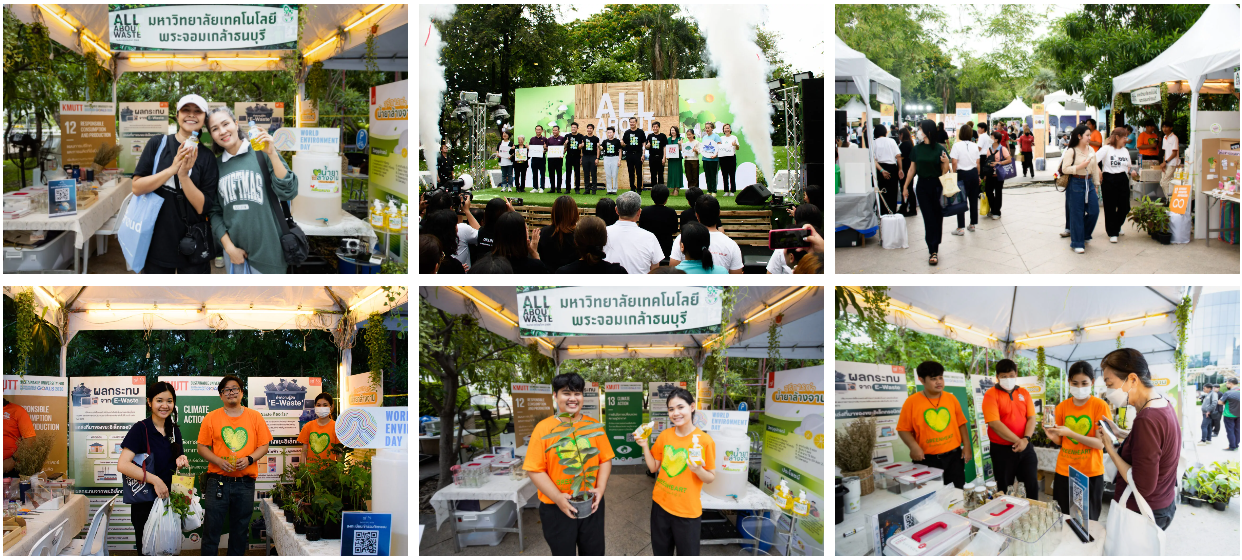
The Sustainable Christmas Tree
A Christmas Tree in Front of You
The KMUTT community’s inventiveness and dedication to the environment are embodied in this Christmas tree. Without going through chemical processing, it was created from materials that were no longer useable or had reached the end of their lifetime. This method encourages sustainable resource usage and gives waste materials new value. Plastic bottles weighing 25 kg, plastic cups weighing 30 kg, 48 old plant pots, 8 kg of paper bags, 1 kg of foam, 0.5 kg of instant noodle wrappers, and 0.5 kg of bottle caps are among the materials utilized. Students and staff kindly contributed these materials to help cut down on waste and give things that are frequently thought of as useless a new purpose.
Converting Trash into Stunning Decorations
Students and staff collaborated to create beautiful and distinctive Christmas ornaments out of regular plastic bottles through a special activity. In addition to lowering waste, this technique provided a forum for fostering creativity and creating meaningful artwork. It highlighted that abandoned materials may be revived with inventive ideas and effort, resulting in a beautifully ornamented Christmas tree.
Little Actions for a Bigger World
This Christmas tree is more than a festive decoration; it is a symbol of KMUTT’s dedication to environmental sustainability. Every donation and creative effort made is a small step toward building a sustainable society. It serves as a source of inspiration for everyone, reminding us that even small actions can contribute to significant change and a brighter future for our planet.
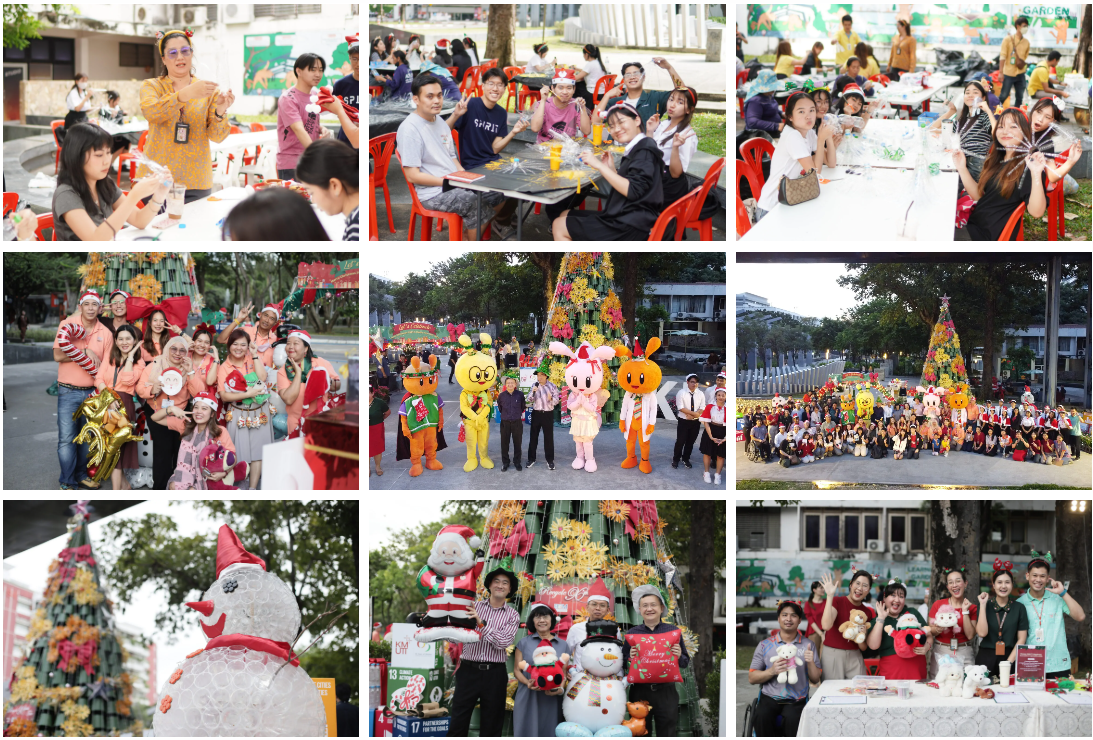
Loy Krathong 2024: A Festival of Culture and Sustainability
The Energy, Environment, Safety and Health Center (EESH) hosted “Loy Krathong 2024” under the theme “Festival of Water: Crafting a Culture of Sustainability” on November 17, 2024. This event highlighted the importance of preserving Thai traditions while ensuring environmental sustainability, aligning with the university’s commitment to the UN Sustainable Development Goals (SDGs).
Key Highlights of the Event:
-
- Eco-Friendly Krathongs Workshop:
Led by the Green Heart student group, this hands-on activity encouraged participants to create sustainable krathongs from natural and recycled materials. KMUTT collaborated with local farmers from the Phutthabucha community, who provided natural materials to support the workshop.
- Eco-Friendly Krathongs Workshop:
-
- Promoting Circular Economy Practices:
A total of 1,457 krathongs were used during the event, with 997 of them being reusable, significantly reducing waste by 68.4%. The EESH Center also provided 460 krathongs for participants, promoting sustainable practices while celebrating this beloved Thai tradition.
- Promoting Circular Economy Practices:
Driving Sustainability Goals:
This initiative supports KMUTT’s roadmap to achieving the SDGs 2030, with a focus on:
-
- Goal 12: Sustainable consumption and production patterns.
-
- Goal 13: Raising awareness about limited resources and preparing for climate change impacts.
-
- Goal 14: Conservation and sustainable use of water resources.
By celebrating Loy Krathong with an eco-friendly approach, KMUTT demonstrated how tradition and sustainability can go hand in hand, inspiring the community to embrace meaningful cultural practices that protect the environment for future generations.

4. Policies around use minimisation
King Mongkut’s University of Technology Thonburi (KMUTT) there is a clear policy towards becoming a sustainable university, which means striving for the creation of a sustainable society, i.e., a modern and caring sovereign society, caring for and developing the world’s ecosystems. This approach to sustainable universities. This happens when using the “sufficiency economy philosophy” as the base for decision-making. This leads to the creation of graduates and staff who help each other to become leaders of change in order to achieve a desirable society (Social Change Agent), which the university has a waste management system, which is the policy of the university with the support of the management. The management system has been developed taking into account activities within the university. Encourage everyone to participate in various forms of waste management, such as promoting waste sorting, as waste sorting can reuse some of the waste that can be used. This will reduce the amount of waste that needs to be disposed of. Organize waste collection and transportation systems within the university and outside to ensure proper and correct waste management. As well as promoting cognitive and practical aspects of university. For more information as link : http://sustainable.kmutt.ac.th/waste/say-no-to-single-use-plastics/
Handout for Waste Management of KMUTT
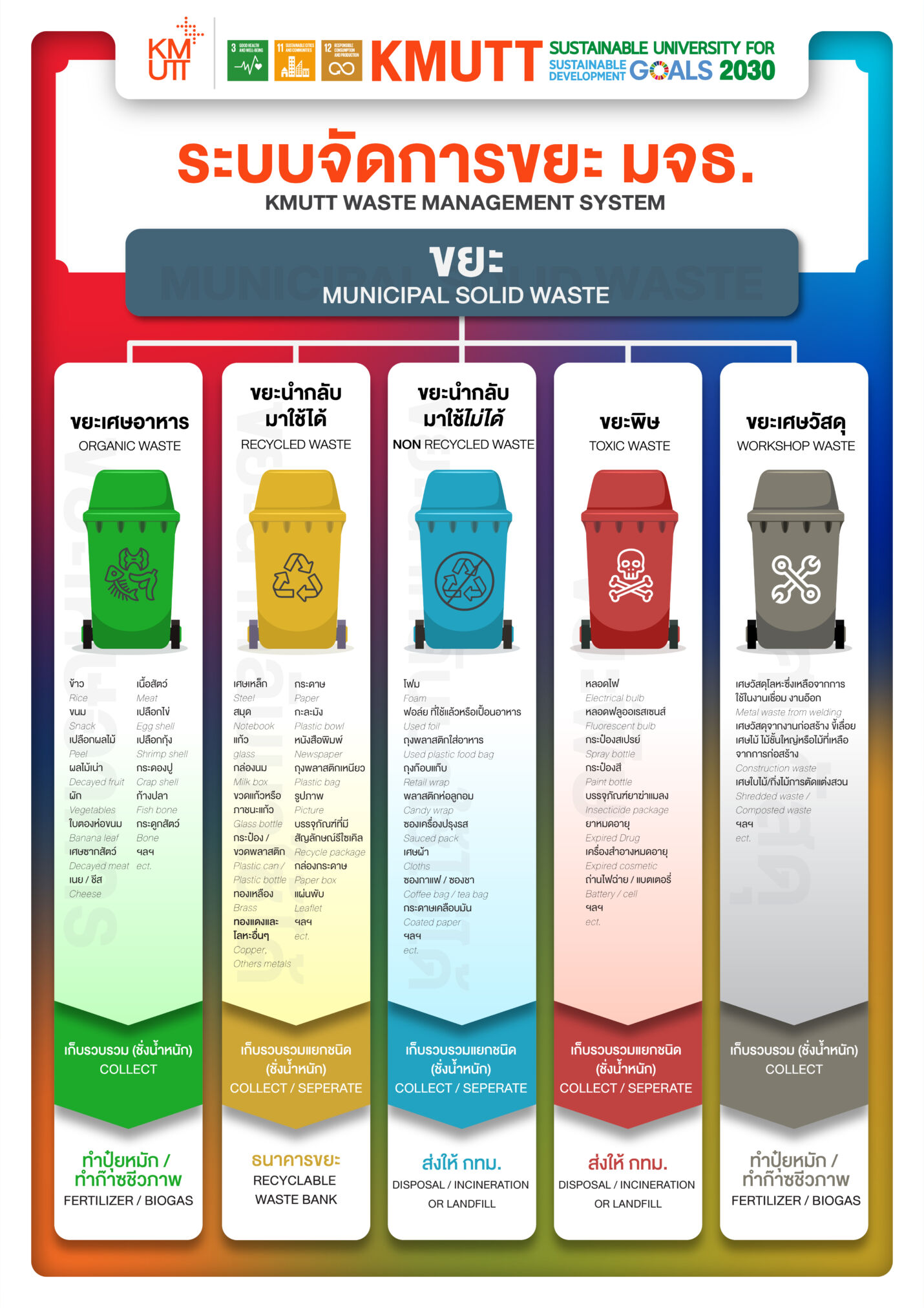
Municipal Solid Waste Management System
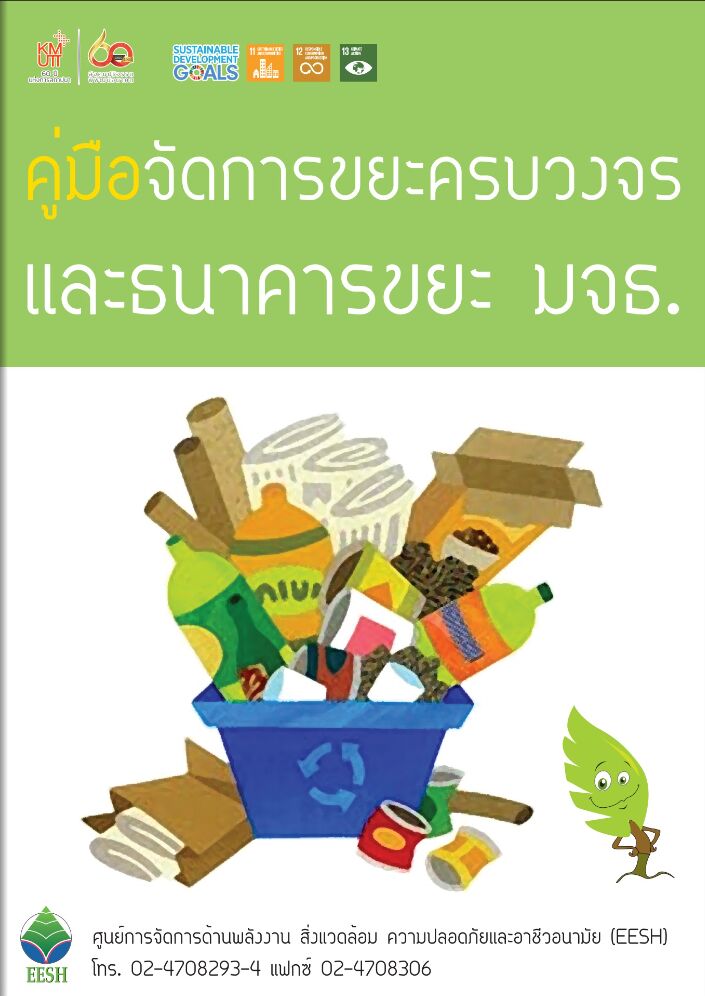
Waste Management

Municipal Solid Waste

Collection and logistic system in KMUTT
Solid waste generated within King Mongkut’s University of Technology Thonburi waste will be sorted into 5 categories: food waste, recyclable waste, non-recyclable waste, toxic waste, and material waste and some types of waste are used, for example, food waste will be brought into the biogas system. Recycled waste will go to the waste bank. Some of the scrap material is recycled or enters the waste bank.
The waste that KMUTT cannot process or dispose of. will be sent to be disposed of through the BMA. The BMA will be sent to the Nong Khaem Solid Waste Disposal Center to enter the waste management system.
Nong Khaem Solid Waste Disposal Center

5. Policy for minimisation of plastic use
KMUTT set up Plastic Reduction program since 2015 and make our goal to “No BIG 4” single use plastics usage (Plastic Bags / Plastic bottles / Plastic Straws / Plastic spoon and fork) within KMUTT by 2020. For plastic reduction program, KMUTT initiate the campaign since 2015 which educate and promote all students and staff to reduce plastic bottle by using personal mug campaign. In 2018, KMUTT has launched student engagement projects which one of the most attractive project is “Say No to Single Use Plastic “ which fit to the goal of Plastic Reduction Program in KMUTT. Also, in 2018 KMUTT promote Personal Food Container usage for all in KMUTT which align to Personal mug usage. For this campaign ,all canteen, food court , coffee shops and convenient store join these activities by 5 baths discount per each of personal food container usage and personal mug usage. Furthermore, KMUTT launch the new campaign to reduce plastic bag by promote all freshman to use fabric bag and reuse bag. Moreover, KMUTT Student council promote this campaign to all students in KMUTT to make KMUTT can reach our goal by 2020.
| Policy to reduce the use of single-use plastics (Single use Plastics) |

Announcement of King Mongkut’s University of Technology Thonburi
Measures to reduce the use of single use plastics
Within King Mongkut’s University of Technology Thonburi
King Mongkut’s University of Technology Thonburi (KMUTT) is committed to developing a highquality energy, environment, safety, and occupational health management system within the university to meet standards and serve as a model for the community and society. Therefore, we promote the prevention of environmental pollution caused by single use plastic packaging. This initiative aims to address environmental issues seriously and mitigate global warming, support the university’s commitment to sustainability in line with the SDGs 2030 goals, and promote the health and well being of the KMUTT community. This commitment necessitates serious and ongoing measures.
To encourage cooperation from all sectors in creating a system to reduce single-use plastic waste, the following measures are hereby announced:
1. Business operators of shops, convenience stores, and food shops within all areas of the university are requested to refrain from providing plastic bags, except for ready to eat cooked food, starting from July 25, 2018.
2. Business operators of shops, convenience stores, and food shops within all university areas are requested not to use plastic forks and straws without customer request or without first asking the customer.
3. All units within the university should publicize, campaign, remind, and raise awareness, as well as issue additional related announcements if necessary, to encourage everyone within the unit to reduce and stop using single use plastics, ensuring strict adherence to these measures for sustainable health and the environment.
Therefore, it is announced for general information and compliance.
Announced on July 3, 2018
(Assoc. Prof. Dr. Sakarindr Phumirat)
President of King Mongkut’s University
6. Policy for minimization of disposable items
KMUTT provides waste management system and encourages student and staff to reduce, reuse, recycle and proper management on treatment and disposal which comply to standard practice and SDG2030. Both municipal solid waste and hazardous waste are managed according to waste hierarchy of reduction, reuse, recycle, treatment and responsible disposal. KMUTT is committed to
1.Waste minimization and waste reduction : Encourage waste source reduction by using the waste minimization and reduce hazardous chemical usage and encourage using products that can be reused or recycled.
2.Reuse and repair : Encourage to reuse equipment, materials or chemicals and repair equipment, materials that can be efficiently use.
3.Recycle: Encourage to recycling of Aluminums and steel cans, cardboard, glass bottles, paper, plastic cartons, scrap metal, shoe bank, textile bank, toner and ink jet cartridges by using recyclable waste bank. Also, encourage to recycling hazardous materials or chemicals if it can be efficiently done.
4.Treatment : Encourage to manage both municipal solid waste and hazardous waste in standard practices and meet regulations on waste treatment.
5.Responsible disposal : Ensure disposal in both municipal solid waste, hazardous waste and electrical waste (E Waste) are carried out in standard practices and meet regulations. Ensure all waste are managed with manual and followed standard practices.
| KMUTT Waste Management Policy |

7. Disposable policy: extensions to service
Repair Café @ KMUTT Extending Product Life to Reduce Waste
King Mongkut’s University of Technology Thonburi (KMUTT) implements a strong disposable-reduction policy through initiatives that prioritize reuse, repair, refurbishment, and life-extension of materials and equipment. One of the most impactful programs under this policy is the Repair Café @ KMUTT, a monthly pop-up event at the Bangmod campus designed to extend the service life of household items, bicycles, electrical devices, and university furniture.
The Repair Café operates through collaboration among students, faculty, technical volunteers, and external partners such as Suanthon GoldCity Cycling Club, Green Cycling Club, KMUTT Cycling Club, and the Department of Electrical Technology Education, together with Innovation Engineering Co., Ltd. This partnership enables the university community to repair damaged items free of charge, reducing unnecessary disposal and supporting KMUTT’s circular economy practices.
The project promotes a hands-on culture of maintenance and repair, allowing participants to learn essential skills in fixing appliances, electronics, and bicycles. This not only saves costs by avoiding the purchase of new items but also helps recover valuable materials that would otherwise be discarded. By extending product life cycles, the initiative directly contributes to energy savings, reduced production demand, lower pollution, and a significant decrease in greenhouse gas emissions associated with manufacturing and disposal processes.
The Repair Café has delivered measurable outcomes that reflect KMUTT’s commitment to extending the life of consumable goods:
- More than 500 bicycle stands have been built from leftover metal pipes, transforming waste into durable campus infrastructure.
- 75 bicycles have been repaired, donated, and reused at the Bike Repairing Center, reducing the need for new resources.
- 121 bicycles were restored and reused as part of the Bike Sharing Campaign, reducing carbon-intensive transportation.
- 145 damaged chairs and desks were repaired and returned to service, reducing procurement of new furniture.
- 120 broken chairs and desks have been recycled and repurposed into materials for student workshops, done in cooperation with the Department of Building and Ground and the EESH Office.
Through this initiative, KMUTT demonstrates how disposable policies can be translated into practical actions that prioritize material retention, reuse, and repair over disposal. The Repair Café serves as a model for extending product service life, minimizing waste generation, and fostering environmental responsibility across the university community fulfilling the core principles of SDG 12.2.7.
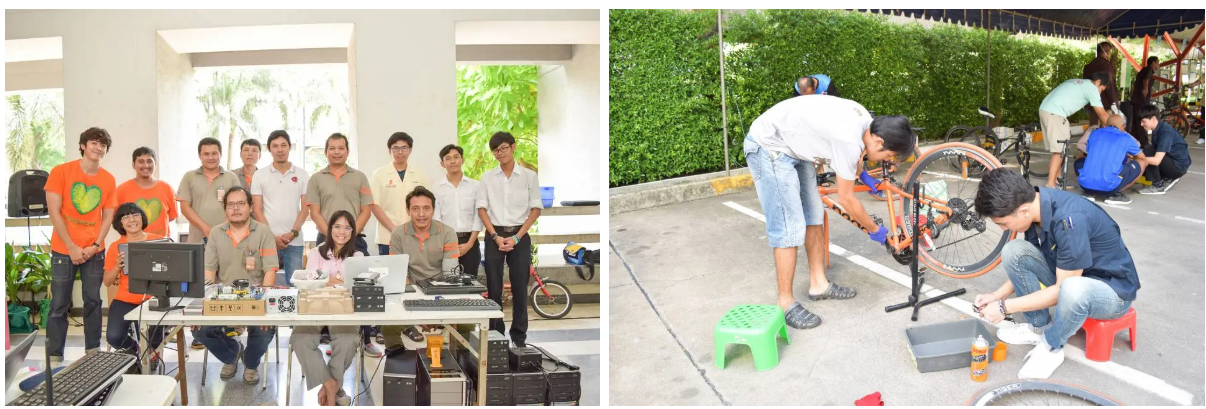
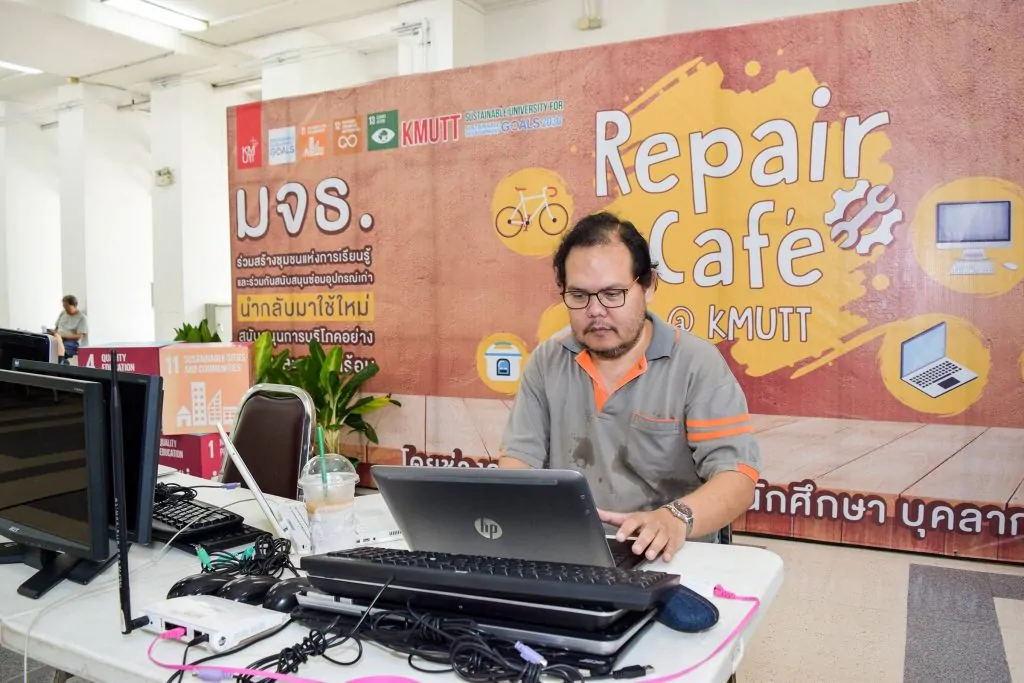
8. Minimisation policies extended to suppliers
Minimisation Policies Extended to Suppliers
King Mongkut’s University of Technology Thonburi (KMUTT) extends its waste minimisation and resource-efficiency policies beyond internal operations to include all suppliers, contractors, and service providers. The university requires external partners to comply with KMUTT’s sustainability guidelines, ensuring that environmentally responsible practices are applied consistently throughout the supply chain.
KMUTT’s procurement framework emphasizes reduction of disposable items, minimisation of packaging waste, sustainable material selection, and responsible handling of leftover materials. Suppliers participating in construction, maintenance, renovation, event operations, and facility services must follow the university’s procedures that reduce unnecessary materials and promote resource efficiency.
Key practices enforced for suppliers include:
1. Requirement to Reduce Single-Use and Disposable Items
Suppliers must avoid single-use plastics, foam materials, and unnecessary disposable packaging when delivering goods or providing services. Reusable containers, refill systems, or bulk packaging are encouraged to reduce waste generation.
2. Sustainable Procurement Standards
Contracts specify that suppliers should provide eco-friendly alternatives, including recycled materials, FSC-certified paper, energy-efficient equipment, and non-toxic cleaning agents. This aligns supplier operations with KMUTT’s sustainable purchasing policy.
3. Waste Reduction in Construction and Renovation Projects
Contractors are instructed to minimise construction debris and are required to separate, collect, and return reusable materials. Leftover materials such as metal pipes, wood, and furniture components are repurposed for university maintenance or student workshops—reducing both waste and procurement of new materials.
4. Compliance with Hazardous Waste Handling Standards
Suppliers dealing with chemicals, laboratory materials, and electronic waste must comply with KMUTT’s hazardous waste management protocols, ensuring safe collection, proper labeling, and return-to-vendor systems.
5. Circular Use of Materials in Supplier Operations
KMUTT actively collaborates with suppliers to identify opportunities for reuse. For example, unused furniture and scrap materials from contractors are refurbished and distributed to student areas, while electronics suppliers retrieve and recycle devices under end-of-life agreements.
6. Environmental Performance Reporting from Vendors
Long-term suppliers are periodically evaluated on waste reduction, packaging minimisation, sustainable material usage, and compliance with green procurement requirements. This ensures continuous improvement and accountability.
Impact and Alignment with SDG 12.2.8
Through these mechanisms, KMUTT ensures that minimisation policies are not restricted to campus operations but are fully integrated into supplier relationships. This approach significantly reduces the environmental footprint of procurement activities, promotes circular economy practices, and ensures that vendors contribute directly to KMUTT’s mission of sustainable development.

King Mongkut’s University of Technology Thonburi has a practice and has an environmentally friendly procurement policy.
| KMUTT Policy environmentally friendly supplies |
| Definition “Chapter 7/2 environmentally friendly supplies Article 27/4 In this section, “environmentally friendly supplies” means goods or services that affect less environmental over or lower than the same product but has the same qualities or qualities or higher than the same product or service considering Procedures for raw material procurement, production, transportation, and reuse, recycle and disposal” |

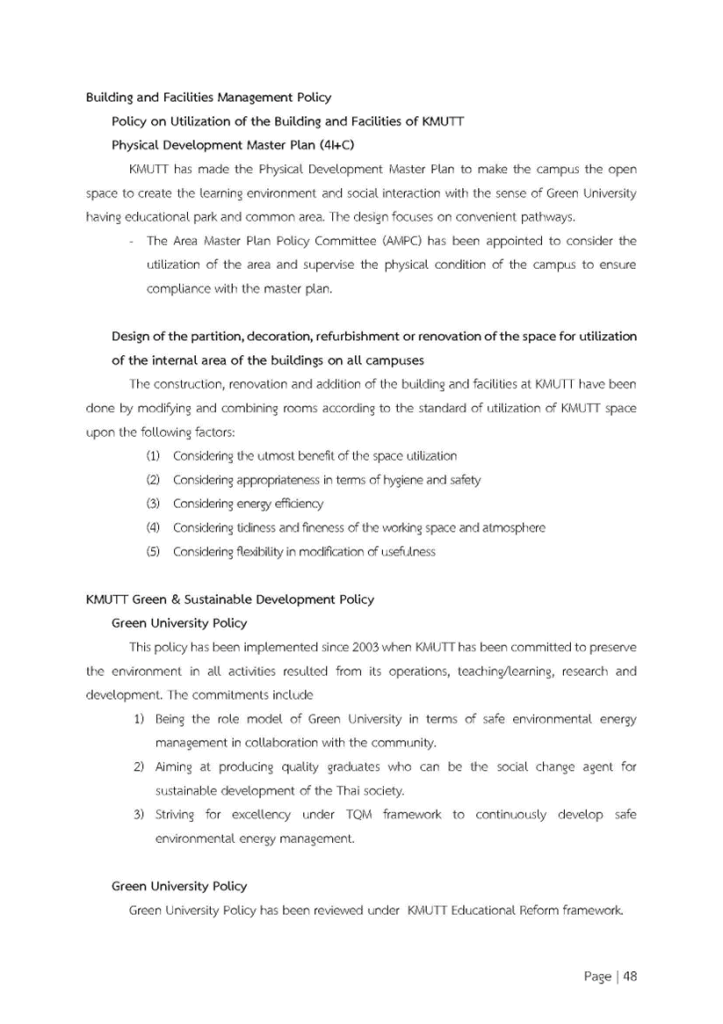
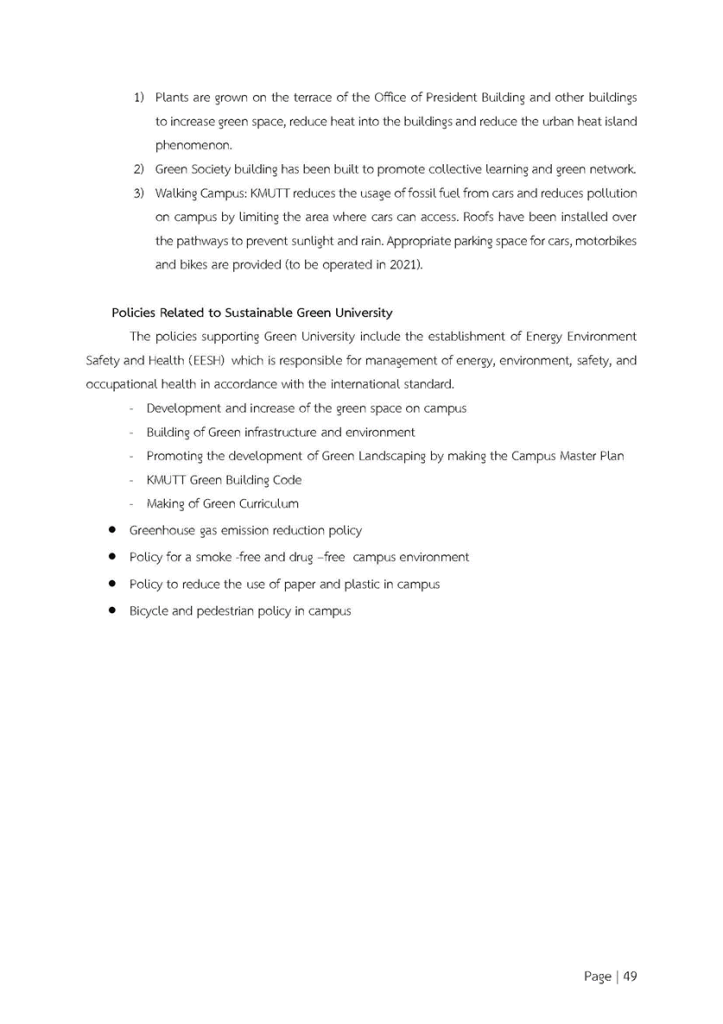
Learning Exchange building
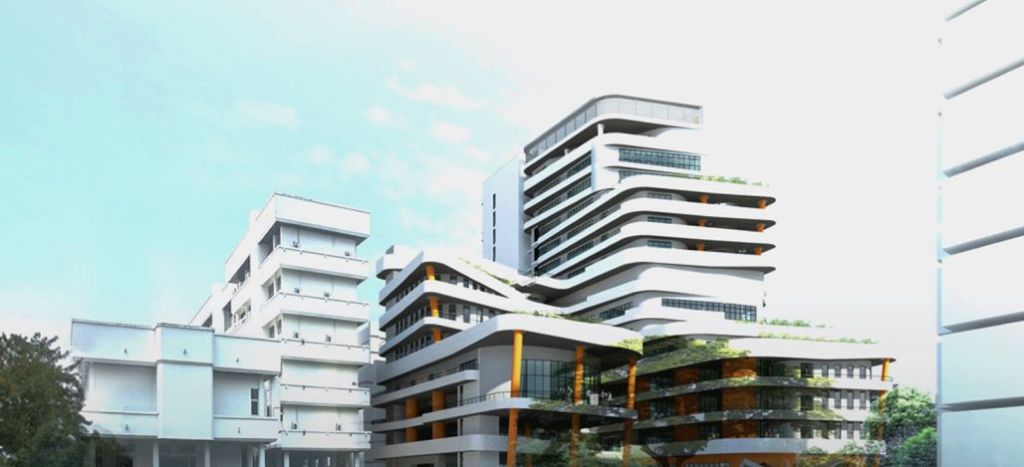
Learning Exchange building (LX) at Bangmod campus is going to open in October, 2019. The concept design of building is education in the 21th century under the slogan of “EVERY WHERE IS FOR LEARNING, EVERTY TIME IS LEARNING AND EVERY ONE IS EDUCATOR”. This building is designed and constructed base on US Green Building Council’s LEED rating system. TREES help guiding for design and construct architecture that is environmental friendly and can increase occupant well–being and productivity comprehensively. The following table shows construction materials which not only made from recycled material but also receive green or eco label where
R– Products made from recycled material
L– In–house product ( save energy on transportation and support local business)
G– Green products and eco label
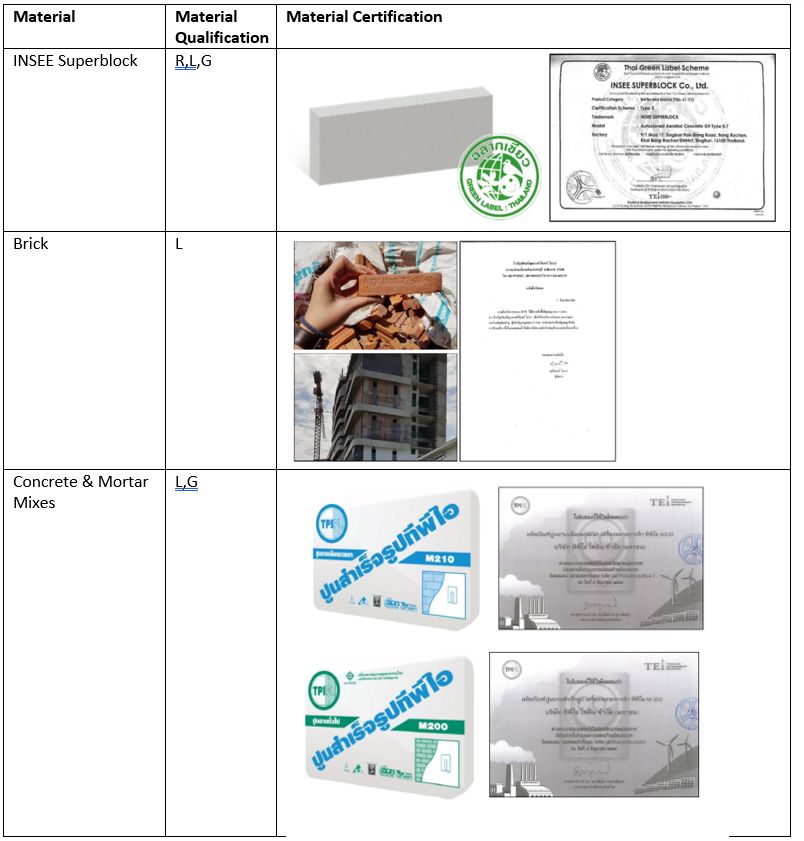





12.3 PROPORTION OF RECYCLED WASTE
1. Related information on our publication of sustainability report.

King Mongkut’s University of Technology Thonburi (KMUTT) has implemented a systematic municipal solid waste (MSW) management system since 2002, ensuring continuous monitoring, recording, and evaluation of waste generation and recycling across the entire campus. The university measures five major waste streams: organic waste, recycled/reused waste, non-recycled waste, toxic waste, and workshop waste. Data collection is conducted annually by the Energy, Environment, Safety, and Occupational Health Management Center (EESH), in collaboration with the Building & Grounds Division.
Waste Measurement and Reporting System
KMUTT’s monitoring framework includes:
- Daily waste collection records from buildings, cafeterias, dormitories, laboratories, and workshops
- Segregation monitoring at source points using color-coded waste stations
- Annual consolidated reporting of total waste generated, recycled, reused, composted, or sent to landfill
- Waste bank deposit records for paper, metal, glass, and plastic
- Performance dashboards visualizing long-term trends (2006–2025)
The system allows KMUTT to assess environmental performance, set reduction targets, and support Thailand’s national circular economy goals.
2. Total Waste Generation (2024–2025)
Based on the latest annual reporting:
- Total waste generated: 563,545 kg/year
- Recycled/Reused waste: 114,891 kg/year (20.39%)
- Organic waste: 191,770 kg/year (34.04%)
- Non-recycled waste: 225,092 kg/year (39.94%)
- Toxic waste: 3,453 kg/year (0.61%)
- Non-recycled workshop waste: 28,339 kg/year (5.03%)
This comprehensive breakdown enables KMUTT to track waste composition trends and prioritize areas for improvement.
3. Waste Recycling Measurement
KMUTT maintains detailed records of materials recovered through the Recyclable Waste Bank, a long-standing on-campus circular economy initiative.
Breakdown of recycled materials:
- Paper: 57,449 kg (50.14%)
- Metal: 31,215 kg (27.22%)
- Plastic: 19,780 kg (17.25%)
- Glass: 6,184 kg (5.39%)
In addition, 218 kg of recycled items were used to support student activities, while other recyclable items were processed through external recycling partners.
4. Long-Term Waste Generation Trend (2006–2025)
KMUTT continuously evaluates long-term MSW generation per capita to monitor policy effectiveness and campus behavior change. Data recorded from 2006–2025 show significant reductions due to improved waste segregation campaigns and community awareness programs.
- Historical peak (2006): 35.84 kg/person/year
- Lowest point (2021): 9.73 kg/person/year
- Recent values:
- 2023: 32.89 kg/person/year
- 2024: 35.43 kg/person/year
- 2025: 31.04 kg/person/year
This long-term dataset reflects seasonal variations, pandemic impacts, return-to-campus phases, and continuous efforts toward waste minimization
5. Waste Diversion and Circular Economy Outcomes
KMUTT’s measurement and monitoring system directly support initiatives that enhance resource efficiency:
- Annual training and exhibitions (≈ 5 times/year) strengthen campus-wide awareness.
- Accurate data allows optimization of recycling routes and reduction strategies.
- The tracking mechanism supports policy decisions on organic waste composting and the reduction of landfill dependency.
KMUTT demonstrates a strong institutional commitment to waste measurement through:
✔ A formal MSW monitoring system operating since 2002
✔ Annual audits and reporting of total waste and recycled waste
✔ Evidence-based waste reduction policies informed by long-term data
✔ Clear tracking of recycled and reused materials across multiple waste categories
✔ Transparent public reporting through dashboards and infographics
This integrated system ensures that KMUTT continually measures, monitors, and improves waste performance in alignment with SDG 12: Responsible Consumption and Production.
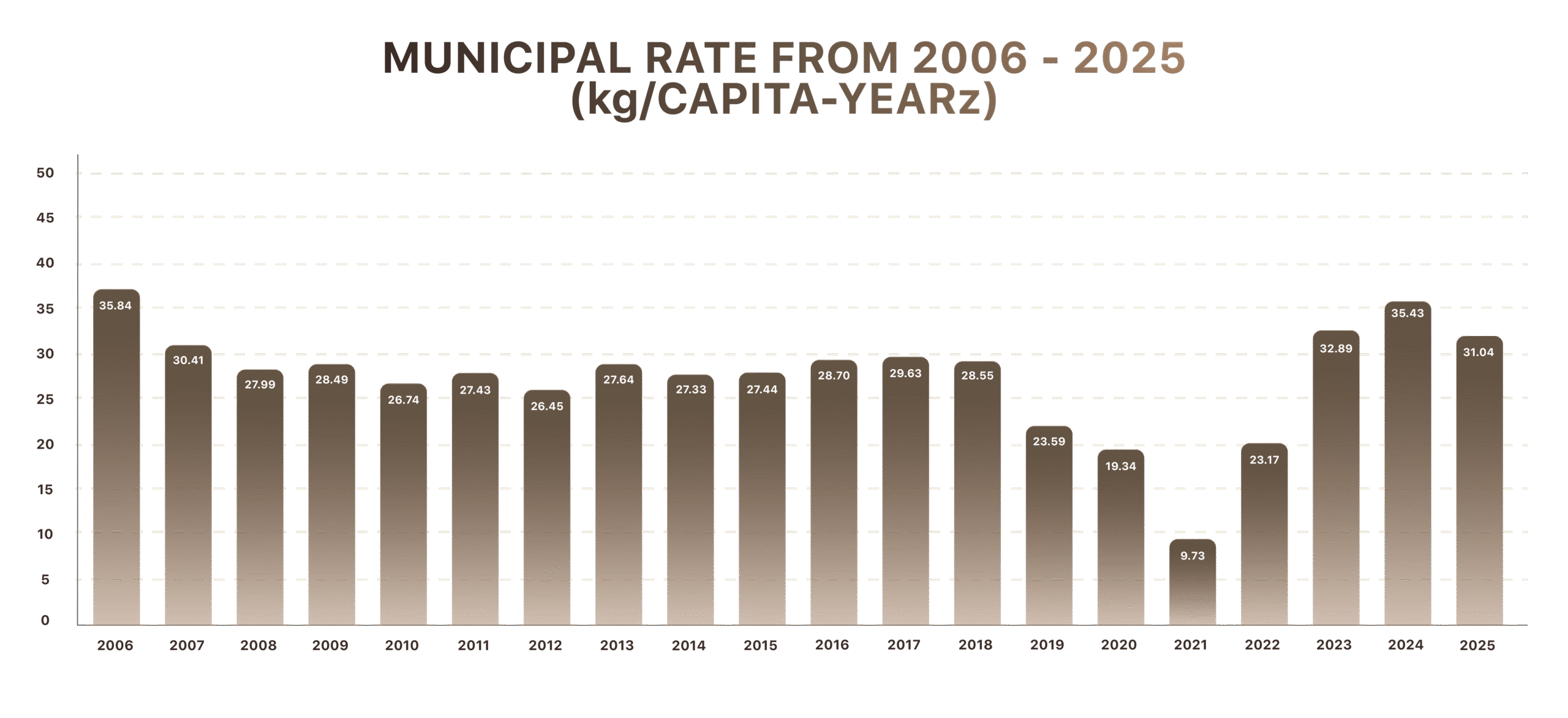
To achieve the KMUTT university policy, municipal solid waste (MSW) management system has been developed since 2002. The system consists of the three main parts: waste segregation, waste collection and waste utilization. Organic waste, recycled waste, non-recycled waste, toxic waste and workshop waste are generate within campus. The system is continuously developing through various activities such as exhibition and training program, which occur 5 times per year. The chart below provides information on the rate of municipal solid waste generation in kilograms/capita-year. Most recently, the generation rate of municipal solid waste, Garden waste, was 31.04 kilograms/capita-year in early 2006. At 35.84 kilograms/person per year, in 2025 it may be reduced by 51.90 %.
KMUTT Municipal solid wastes in 2025
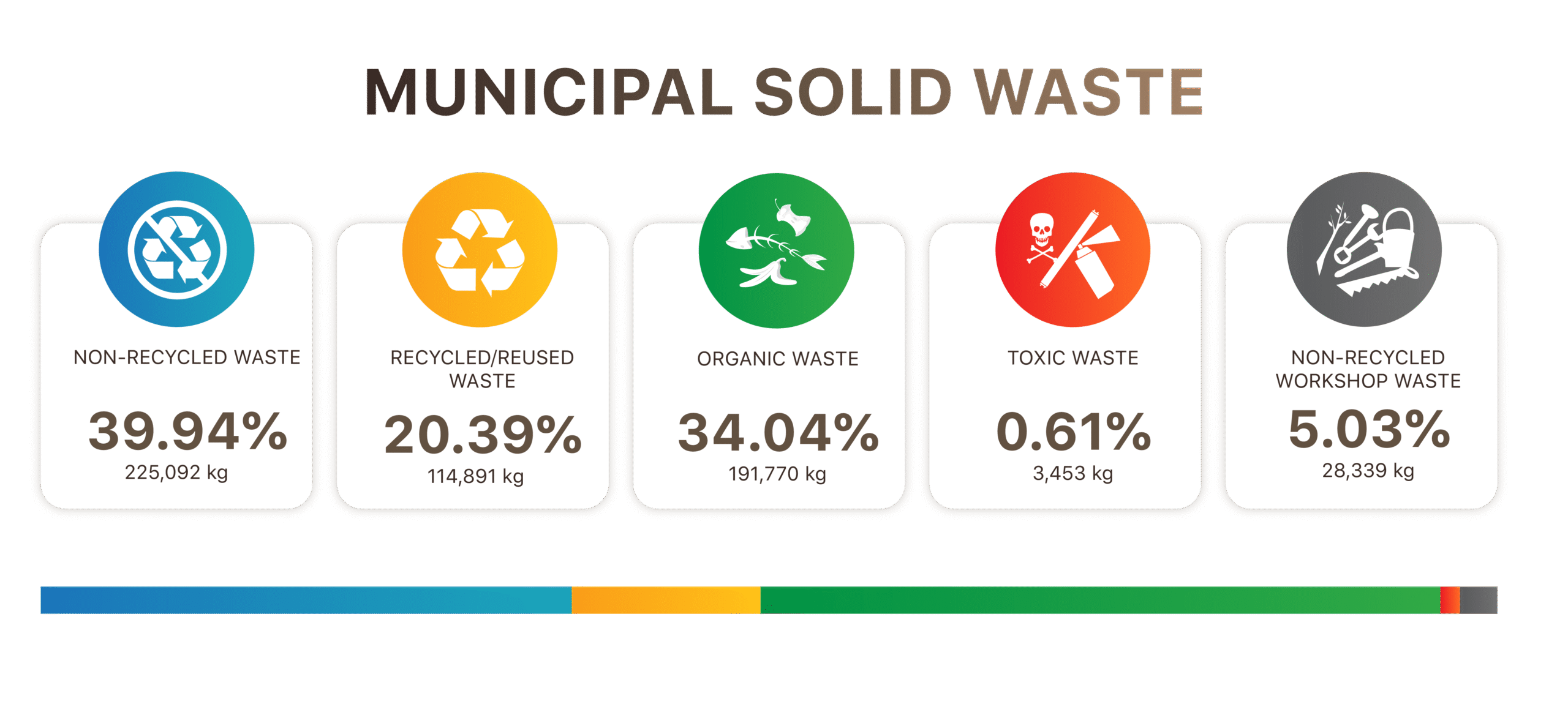
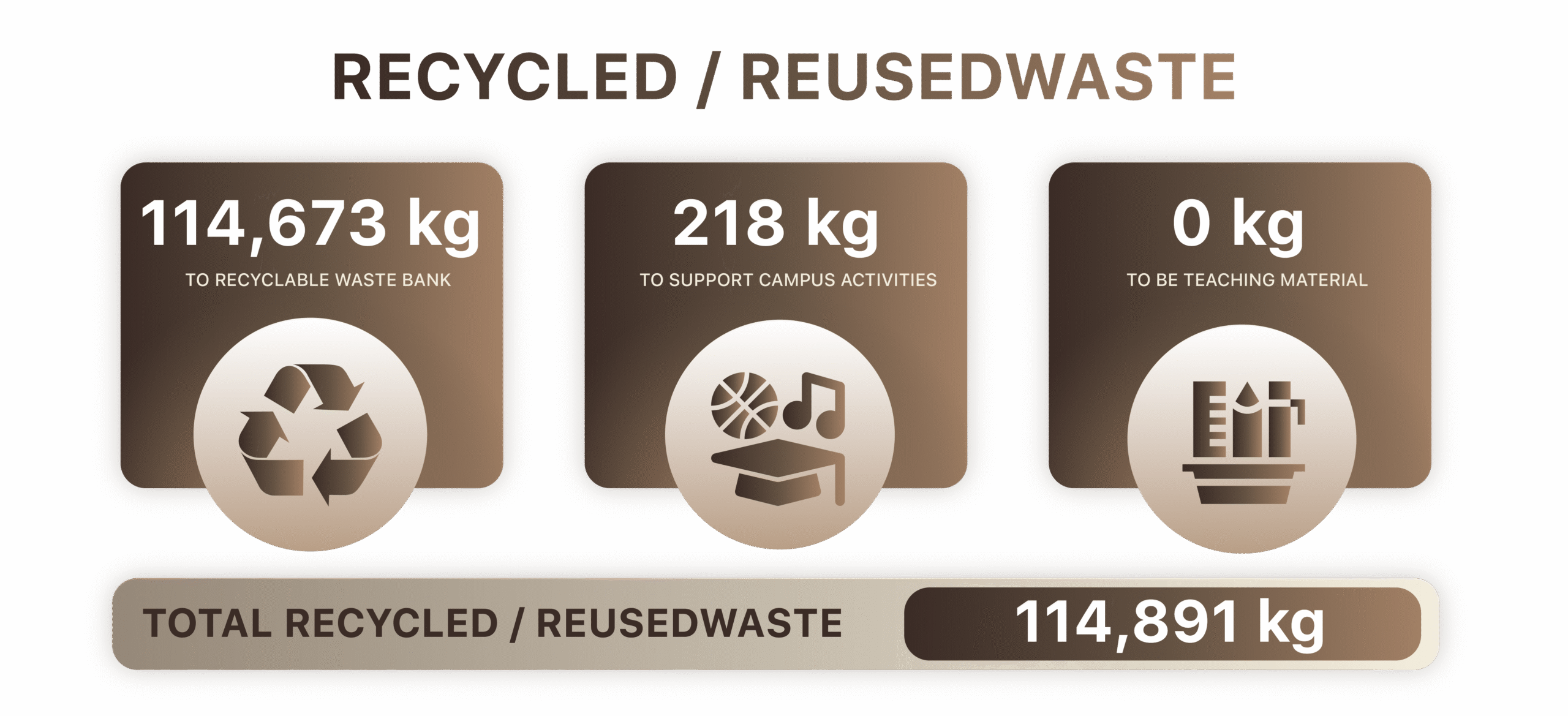
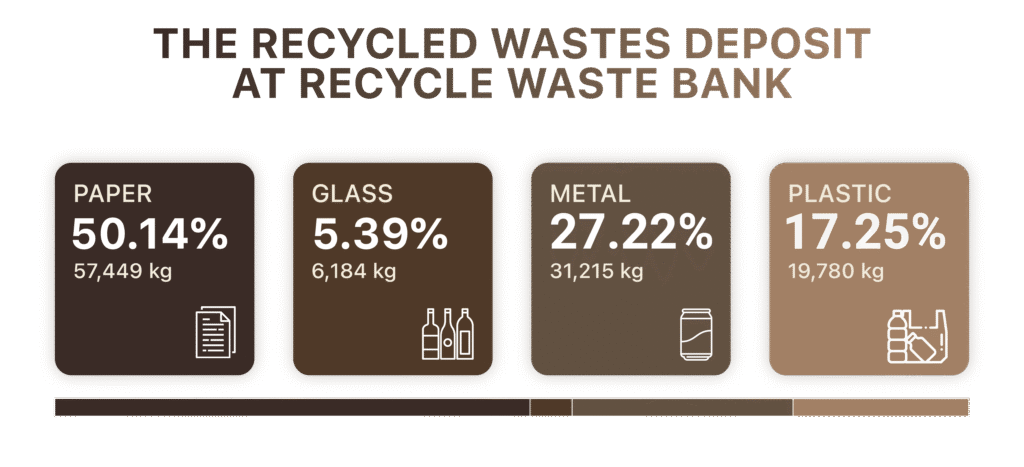
12.4 PUBLICATION OF SUSTAINABILITY REPORT
1. Related information on our university as a body on measuring the amount of waste generated and recycled across the university.
King Mongkut’s University of Technology Thonburi (KMUTT) publishes an annual Sustainability Report that transparently presents the university’s environmental, social, and governance (ESG) performance. The report aligns with the UN Sustainable Development Goals (SDGs) and serves as a key mechanism for communicating KMUTT’s progress, policies, and achievements in sustainability to students, staff, stakeholders, and the global community.
KMUTT’s Sustainability Report includes comprehensive data and analysis on various aspects such as energy and climate action, waste management, water use, biodiversity conservation, social inclusion, student and community engagement, governance, and campus development. The report is structured to demonstrate how KMUTT integrates sustainability principles into its operations, academic programs, research, and community services.
The Sustainability Report is publicly accessible on the KMUTT Sustainability website, ensuring full transparency and open access for internal and external stakeholders. This continuous publication reflects the university’s commitment to accountability, responsible management, and long-term sustainability development.
Published Reports:
- KMUTT Sustainability Report 2025
https://sustainable.kmutt.ac.th/pdfviewer/kmutt-sustainability-report-2025/?auto_viewer=true#page=&zoom=auto&pagemode=none - KMUTT Sustainability Report Archives
https://sustainable.kmutt.ac.th/report.php
These reports provide verified data, annual performance highlights, and future sustainability targets, demonstrating KMUTT’s dedication to transparency and continuous improvement in sustainability management.

This is an interactive report. Use the navigation bar and the page titles on the contents page to jump to specific sections. Clicking on in-text links will direct you to more information outside of the report.
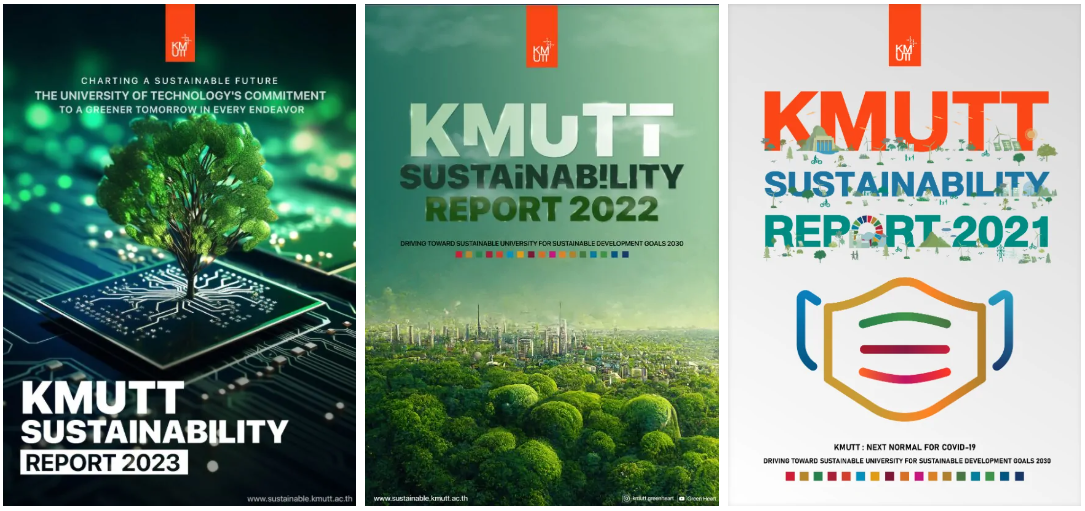

SDG 12: Responsible Consumption and Production
Overview of Operations at King Mongkut's University of Technology Thonburi (KMUTT)
Sustainable Procurement
Adheres to ministerial regulations, promoting SMEs, community groups, and disability organizations.
Waste Sorting Policy
Sorts waste into five categories (food, recyclable, non-recyclable, toxic, material) for proper disposal.
"No BIG 4" Plastic Ban
Aims to eliminate single-use plastics (bags, bottles, straws, spoons/forks) via campaigns.
Repair Café Policy
Extends product life via "Repair Café @ KMUTT," repairing over 500 stands, 75 bicycles, 145 chairs.
Minimization Policy
Offers discounts for using personal mugs and food containers in campus shops.
Food & Water Safety
Appoints a committee to ensure access to clean water and healthy food for students and staff.
"Beat Plastic Pollution"
World Environment Day 2025 campaign exchanged 12.7 kg of waste for potted plants.
"All About Waste" Campaign
Workshops on dried flower terrariums, textile art, and homemade dishwashing liquid.
Sustainable Christmas Tree
Used 25 kg plastic bottles, 30 kg plastic cups, and 48 plant pots, all repurposed.
Eco Loy Krathong (2024)
Used 1,457 krathongs (997 reusable), reducing waste by 68.4% with natural materials.
"Green Hero Kids"
Taught waste sorting and recycling to children in the Benjasuk Community.
Eco-Friendly Events
Waste separation guided by volunteers at Graduation Ceremony and "First Date 2025" orientation.
Waste Stats (2024-25)
563,545 kg total waste: 20.39% recycled, 34.04% organic, 39.94% non-recycled.
51.90% Per Capita Reduction
Per capita waste generation decreased from 35.84 kg (2006) to 31.04 kg (2025).
Key Rates
Waste diversion rate 62% (+9%), single-use plastic reduced by 48% (YoY), 38% sustainable procurement (+6%).
LEED Buildings
The Learning Exchange (2019) uses recycled materials (R), local products (L), and green items (G).
Annual Sustainability Reports
Provides transparent ESG data, including waste tracking via dashboards and infographics since 2025.
Waste Bank (Recycled)
57,449 kg paper, 31,215 kg metal, 19,780 kg plastic, 6,184 kg glass.
Waste Management
A comprehensive system to reduce, reuse, recycle, and responsibly dispose of all campus waste.
Reduce Paper & Plastic
A targeted initiative to prevent pollution by eliminating single-use plastics and reducing paper consumption.
Sustainable Procurement
Ensures all procurement prioritizes value, transparency, and aligns with Green University principles.
Green University
Commits to leadership in sustainability, creating mechanisms to develop change agents for a better quality of life.


